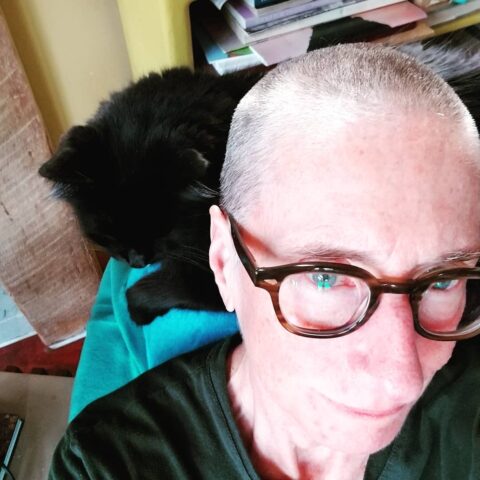I appreciate how you’re willing to play with seeming contradictions on the page—for instance, “You are obviously a little bit in love with me. I don’t recognize it,” and “I know and I don’t know we are on a date.” Could you speak to your thoughts on including details or telling stories in creative nonfiction that might not necessarily paint you, the understood speaker, in the most flattering light? What are the benefits and drawbacks?
When I started writing reviews of my exes, including star ratings, they were going to be funny. I was going to skewer and exorcise calcified pain and embarrassment. Unfortunately, the lessons of J-school are deeply embedded in me: My funny stories tripped and fell into a cistern of stanky facts. I owe my lovers and their stories the truth. And the truth is, I’m always the asshole. Not the only asshole, but at least one of them. Perhaps this is why I always swore I’d never write memoir—which was, of course, a red flag to Bitchmuse.
What compelled you to tell this story using the form of a performance evaluation? What do you think the form adds to the piece?
This review (one of twenty-one, including a review of me, which is by far the harshest) began as more of an Amazon-style product review. What transpired was more storytelling than quality assessment. It reminded me of the hated annual performance evaluations I had to do in corporate jobs, which always turned into me overachieving in essay form. That form seemed to fit the style of honesty these pieces demanded. For me, story arises from form and form arises from story (gassho to Heart Sutra), and this story really couldn’t exist in another form. Trust me, I’ve tried and failed to write about Pearl for decades.
I think it’s fair to say Pearl’s annual suicide trip to San Francisco is a focal point, as it’s mentioned twice in a seven-hundred-word piece. What of Pearl’s character is this detail meant to reveal for your reader, and why did you choose to end with a reiteration of it?
That annual trip is the scab under which festers the larger, sad story of Pearl, a story of diaspora. Pearl’s Korean mother shipped Pearl to her father in the States when she was six. Pearl did not remember her own Korean name, nor her bio mother. The woman she called “Mom” was the lady her dad happened to be dating when Pearl arrived in the States. Pearl was quite beautiful. Everyone wanted her, nobody truly knew her. She had no home. She had no “real” name. If any of that peeks through, maybe it begins to do her justice.
What compels you about experimental form, and who are your influences in this regard?
Without constraint, lacking a form to rage against, story doesn’t happen for me. And without experiment, I might as well stick to software documentation—it’s certainly more profitable. My influences in form are my influences, period. Marguerite Duras. Ovid. Samuel Delaney, specifically Dahlgren. Infinite Jest. Italo Calvino. Oulipo! And always and especially, the elegant forms of zazen practice.
As a reader and writer, what would you like to see more or less of in literary magazine publishing?
I am old and white and pass for cis female (whether I want to or not). I want to see fewer people like me in charge of things. I want more voices who aren’t like me, who couldn’t pass if they tried. I want to read more shit I don’t understand. I want to have to stop and look things up. I want words and sound and movement and images and flavors combined in ways that make me uncomfortable. I want you to push me. Challenge me. No, for real. Don’t just say you want to in your call for submissions. Really do fucking push me.



 The core workshop of SmokeLong Fitness is all in writing, so you can take part from anywhere at anytime. We are excited about creating a supportive, consistent and structured environment for flash writers to work on their craft in a community. We are thrilled and proud to say that our workshop participants have won, placed, or been listed in every major flash competition. Community works.
The core workshop of SmokeLong Fitness is all in writing, so you can take part from anywhere at anytime. We are excited about creating a supportive, consistent and structured environment for flash writers to work on their craft in a community. We are thrilled and proud to say that our workshop participants have won, placed, or been listed in every major flash competition. Community works.